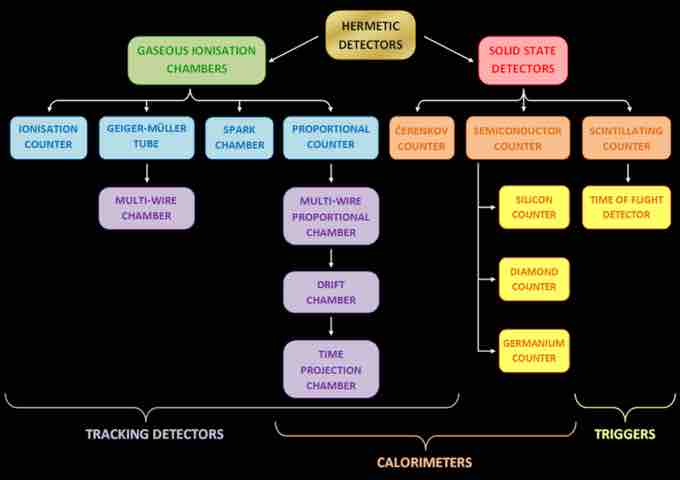A radiation detector is a device used to detect, track, or identify high-energy particles, such as those produced by nuclear decay, cosmic radiation, and reactions in a particle accelerator. Modern detectors are also used as calorimeters to measure the energy of detected radiation. They may be also used to measure other attributes, such as momentum, spin, and charge of the particles. Different types of radiation detectors exist ; gaseous ionization detectors, semiconductor detectors, and scintillation detectors are the most common.

Different Types of Radiation Detectors
different types of radiation detectors (counters)
Gaseous Ionization Detectors
Gaseous ionization detectors use the ionizing effect of radiation upon gas-filled sensors. If a particle has enough energy to ionize a gas atom or molecule, the resulting electrons and ions cause a current flow, which can be measured.
Semiconductor Detectors
A semiconductor detector uses a semiconductor (usually silicon or germanium) to detect traversing charged particles or the absorption of photons. When these detectors' sensitive structures are based on single diodes, they are called semiconductor diode detectors. When they contain many diodes with different functions, the more general term "semiconductor detector" is used. Semiconductor detectors have had various applications in recent decades, in particular in gamma and x-ray spectrometry and as particle detectors.
Scintillation Detectors
A scintillation detector is created by coupling a scintillator -- a material that exhibits luminescence when excited by ionizing radiation -- to an electronic light sensor, such as a photomultiplier tube (PMT) or a photodiode. PMTs absorb the light emitted by the scintillator and re-emit it in the form of electrons via the photoelectric effect. The subsequent multiplication of those electrons (sometimes called photo-electrons) results in an electrical pulse, which can then be analyzed. The pulse yields meaningful information about the particle that originally struck the scintillator.
Scintillators are used by the American government, particularly Homeland Security, as radiation detectors. Scintillators can also be used in neutron and high-energy particle physics experiments, new energy resource exploration, x-ray security, nuclear cameras, computed tomography, and gas exploration. Other applications of scintillators include CT scanners and gamma cameras in medical diagnostics, screens in computer monitors, and television sets.